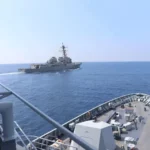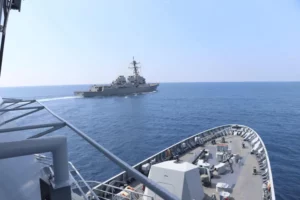Since Russia declared the start of its special military operation in Ukraine on February 24 it has become increasingly clear with each passing day that what the world is witnessing is only a conflict between Russia and Ukraine in form. In essence it is a proxy war between the Russian Federation on the one hand and the US-led NATO imperialist forces on the other. Moreover, it also becomes increasingly clear that this is a conflict that carries with it the greatest threat of a nuclear conflict in decades, something that would represent a cataclysmic and existential disaster for humanity as a whole.
The evidence for this is overwhelming. It is spewed from the mouths of the leaders of the imperialist powers, particularly the United States and its British lapdog, on a daily basis. On April 25, the New York Times wrote:
“The United States toughened its messaging on the Ukraine war on Monday, saying the American aim was not just to thwart the Russian invasion but also to weaken Russia so it could no longer carry out such military aggression anywhere.
“The aim was stated in explicit terms by the highest-ranking Biden administration delegation to visit Ukraine since the war began. It reflected an emboldened intent to counter Russia by giving more numerous and powerful arms to the Ukrainians.”
The New York Times was referring to statements made in Poland by Secretary of State Antony Blinken and Defense Secretary Lloyd Austin who had just visited Kiev.
On April 28, speaking from the White House, President Joe Biden said:
“So, we need to contribute arms, funding, ammunition, and the economic support to make their [that is the forces of the Kiev regime] courage and sacrifice have purpose so they can continue this fight and do what they’re doing.”
“This assistance”, Biden continued, “would provide even more artillery, armored vehicles, anti-armor systems, anti-air capabilities that have been used so effectively thus far on the battlefield by the Ukrainian warriors.”
The amount that Biden was calling on Congress to further authorise in its proxy war against the Russian Federation is an eyewatering $33 billion dollars. In addition to the billions that have already been expended in this crusade. Considering that, at time of writing, the number of confirmed deaths from Covid-19 in the USA had reached 1,021,581; considering that millions of Americans lack access to health care; and considering that much of the USA’s crumbling infrastructure is a good half century out of date, it is surely not hard to think of better uses to which such colossal sums might be put.
Such American bellicosity is not only not followed by the overwhelming majority of countries in the Global South. Even some of the USA’s imperialist allies appear to be having doubts and second thoughts.
On May 1st, following yet another morale boosting visit to the comedian President Zelensky, this time by US House Speaker Nancy Pelosi, the New York Times quoted French defence analyst Francois Heisbourg as saying that there is a sense in Europe that “the US is dragging everyone into a different war.”
“To help Ukraine prevail is not about waging war against Russia for reasons related to its governance,” Mr. Heisbourg said. “Regime change may be a vision, but not a war aim.”
Gérard Araud, a former French ambassador to the United States and the United Nations, commented on Twitter:“Right now, we are sleepwalking to nobody knows where.” Sleepwalking may well describe it, but as with World War I, to which the sleepwalking analogy is generally attached, the possible destination is all too clear – years, perhaps decades of war, with the ever present risk of suicidal escalation. However, if a few such voices of relative sanity are to be found in Paris and Berlin, this is sadly not the case in London. To the extent that there is a split in the warmongering consensus it is to be found in the opposition Labour Party seeking to push the Conservative government into even more bellicose positions. In this they are joined by the governmental representatives of the hard right of the Conservative Party, who seek to use the conflict with Russia, and the conflict they seem determined to also provoke with China, as a pawn in their increasingly transparent factional manoeuvring to replace Boris Johnson as Prime Minister. Meanwhile, Labour leader Keir Starmer has bullied the small number of left-wing Labour members of parliament into silence, declaring that opposition to, or even, it would appear, criticism of NATO is incompatible with membership of the parliamentary party.
Therefore, on his way to a visit to India last month, Boris Johnson declared:
“How can you negotiate with a crocodile when it’s got your leg in its jaws? That’s the difficulty that the Ukrainians face. We have just got to keep going with the strategy, keep supplying them with weapons.”
In other words, the British Prime Minister, supported and indeed egged on by what currently passes for an opposition in our country, is joining the likes of Biden, Austin, Blinken and Pelosi in setting his face against peace, setting his face against negotiations and clamouring for protracted and endless war against Russia – a war which imperialism appears more than ready to fight to the last Ukrainian.
In the same media comments, Johnson remarked:
“The view of the president of Ukraine, if I understood him correctly, I speak to him a lot, is he would actually like Russian forces to be expelled from their existing positions in Donetsk and Luhansk. So that is a pretty maximalist position, but on Crimea they are not as maximalist.”
You may well think this is bad enough, but there’s worse.
Delivering the Mansion House speech, a traditional annual outline of UK foreign policy, on April 27, the Foreign Secretary Liz Truss essentially set out her platform for a future Prime Ministerial bid – a highly dangerous platform of all out confrontation with both Russia and China.
Truss declared: “So we must be prepared for the long haul. We’ve got to double down on our support for Ukraine. And we must also follow through on the unity shown in the crisis.”
And just in case there was any room for doubt, she continued:
“We are already stepping up in Ukraine. The war in Ukraine is our war – it is everyone’s war because Ukraine’s victory is a strategic imperative for all of us. Heavy weapons, tanks, aeroplanes – digging deep into our inventories, ramping up production. We need to do all of this.
“Our sanctions have already seen Russia facing its first external debt default for a century. We need to go further. There must be nowhere for Putin to fund this appalling war. That means cutting off oil and gas imports once and for all…
“We are doubling down. We will keep going further and faster to push Russia out of the whole of Ukraine.”
As numerous commentators have highlighted, Truss in this last statement is making clear that for her, the war aims relate not simply to Ukraine, Luhansk and Donbas, but also to Crimea, the very territory with regard to which her ostensible boss had practically yesterday intimated at least a modicum of realism and flexibility.
Surely one cannot separate the decision of the Russian leadership to embark on a special military operation in Ukraine from the clear intent to weaken and destroy Russia that has been spelled out with such brutal clarity by the leaders of US-led imperialism.
This in fact has always been the prime purpose of NATO, ever since its creation in 1949. With the dissolution of the USSR in 1991, the organisation lost its ostensible raison d’etre. However, far from joining the Warsaw Treaty Organisation in winding up its affairs, NATO engaged in a wave of rabid expansion.
Since 1949, NATO membership has increased from 12 to 30 countries in eight rounds of expansion, the majority of them since the dissolution of the Soviet Union. This despite the promises made to Gorbachev by US leaders that NATO would not move “one inch east” if he would acquiesce to German reunification. Little wonder that, in the period leading up to the special operation, President Putin declared that NATO had left Russia nowhere to retreat to.
As if the successive accession of the Czech Republic, Hungary, Poland, Estonia, Latvia, Lithuania, Bulgaria, Romania, Slovakia, Slovenia, Albania, Croatia, Montenegro and North Macedonia to NATO membership after the dissolution of the Soviet Union was not bad enough, the organisation has sought to further spread its tentacles through the creation of the Partnership for Peace programme. Besides having served as a waiting room for full membership for the afore-mentioned 14 countries, the PfP has, inter alia, grouped various former republics of the USSR, including a number who also adhere to the Collective Security Treaty Organisation, as well as a number of at least nominally neutral European countries, such as Austria, Ireland, Malta, Finland and Sweden, with the latter two now seemingly embarked on the road towards full membership.
It is perhaps not sufficiently well known that both the USSR and its main successor state the Russian Federation expressed a wish to join NATO on more than one occasion. This was first mooted in March 1954 by Soviet Foreign Minister VM Molotov, but rejected by the western powers in May of that year. Decades later, in 2017, Vladimir Putin told the US film maker Oliver Stone that he had raised the possibility of Russia joining NATO with President Clinton in January 2001.
What conclusion, then, can one draw with regard to the intention of a military organisation that moves progressively closer to one’s door, which affirms and asserts the right of every country to seek membership, but which steadfastly refuses to entertain your own application?However, NATO is not just a threat to the Russian Federation. It is a threat to the whole world – to global peace and to every country that seeks to maintain its independence and choose its own path of development.From March to June 1999 NATO subjected the Federal Republic of Yugoslavia, a multi-ethnic, multi-national state, and, along with Belarus, the last country in Europe maintaining at last some degree of socialist orientation, to a savage bombing campaign.
Following the 9/11 terrorist attacks in the United States, the US invoked NATO’s Article 5, regarding collective defence, leading to a 20-year NATO occupation of Afghanistan, which finally met an ignominious end in August 2021.
Subsequent collective defence measures have been invoked with regards to Syria, Libya, the Horn of Africa and Ukraine.
NATO has further created a network of so-called “global partners”, which, among others, include Australia, Colombia, Japan, South Korea and New Zealand.
In 2018, the Venezuelan Foreign Ministry reacted to Colombia’s becoming NATO’s first Global Partner in Latin America, by stating:
“Venezuela denounces once more before the international community the intention of the Colombian authorities to lend themselves to introduce, in Latin America and the Caribbean, a foreign military alliance with nuclear capacity, which in every way constitutes a serious threat for peace and regional stability.”
The participation of South Korea and Japan can only be regarded in the same light by the Democratic People’s Republic of Korea, as well as by China and Russia.
Indeed, China looms increasingly large in NATO’s concerns. The ‘NATO 2030’ document, adopted at its 2020 summit, labelled China a “full-spectrum systemic rival”. Attempting to explain, Secretary-General, and former Norwegian Labour Party Prime Minister, Jens Stoltenberg, asserted that China poses “important challenges to our security”, adding that China “is coming close to us”. A reasonable, indeed sane, person might conclude that it is precisely the other way round!
NATO’s pivot to China is underlined and reinforced by the development of the Quad, grouping the United States, Japan, Australia, and India, with the possible addition of South Korea following the narrow victory of the conservative candidate in the recent presidential election, along with the AUKUS partnership, which is slated to introduce nuclear-powered submarines to the Pacific Ocean, and despite the latter also constituting a stab in the back to NATO member France.
The brutal logic of NATO’s increasingly global reach, and the danger it poses to peace in this current phase of enhanced imperialist aggressiveness was spelled out with unmistakeable clarity, by Liz Truss in her April 27 speech, where she declared:
“We need a global NATO… We need to pre-empt threats in the Indo-Pacific, working with our allies like Japan and Australia to ensure the Pacific is protected. And we must ensure that democracies like Taiwan are able to defend themselves… We should keep strengthening our NATO alliance with bonds around the world, like the UK-led Joint Expeditionary Force, the 5 Eyes, and the AUKUS partnership we have with the US and Australia… The G7 should act as an economic NATO, collectively defending our prosperity.”
These are not the speculations or ravings of some lonely conspiracy theorist. They are the authentic words of the United Kingdom’s Foreign Secretary and possible future Prime Minister.
However, in the words of the Spokesperson of the Chinese Embassy in London, reacting the next day:
“Gone are the days when a handful of Western countries could manipulate international rules and monopolise world affairs! The imperialist and Cold-War mindset betrayed in the above mentioned remarks of the UK side are against the will of the people of the world and utterly anachronistic!”
What is needed in the present situation is the broadest possible unity of countries and peoples throughout the world aimed at halting NATO’s drive to a world war that would surely endanger the very survival of humanity. China and Russia are at the core of this anti-imperialist, anti-hegemonic united front for peace.
Source : Keith Bennett
















Add Comment